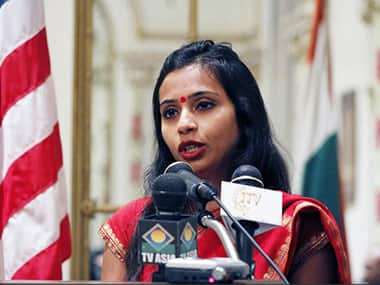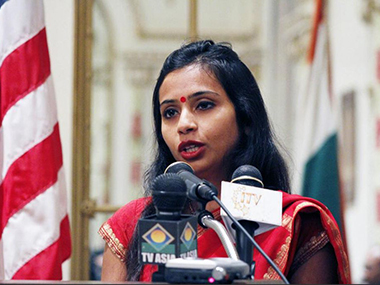Thosuands of Indians are languishing in foreign jails with or without a fair trial; an Indian sailor is unable to see his child’s body because he is wrongfully confined in a distant land of Togo; and India takes years to bring its nationals from Sri Lankan prisons even after the island nation agrees to hand them over. But the republic of India was never as outraged as it is now when a middle level foreign service official is booked in the US for allegedly violating its laws. The uproar that we witnessed over the last few days is unprecedented and it even made it into the parliament where the external affairs minister vowed that he will bring back the official. Cutting across class barriers, the country was united in its expression of outrage - whether it’s the newspapers, TV studios, the parliament or public spaces: This is an issue of India’s sovereignty and pride and that it was a conspiracy by the US to slight us. We shouldn’t take it lying low. We should hit back. [caption id=“attachment_1296335” align=“alignleft” width=“380”]  Devyani Khobdagade.[/caption] However, what we have ignored in our moments of effusive national pride is that our entire outrage was based on the one-sided story of an IFS officer, Devyani Khobragade, against a fellow Indian woman on whom she has complete control. The story, as told by her through the influential foreign service community, the government of India and her father, who was a former IAS officer in Maharashtra. According to them, Devyani has done no wrong and this is a conspiracy by the US, using the maid as a willing bait. The maid wanted to settle down in the US and hence ran away. All her stories are lies. Devyani’s father, whose name reportedly figured in Adarsh housing scam, even imputed that it was a conspiracy, hatched by the US right from the time of granting visa to the maid. He almost sounded that the maid was a plant by the US to trap her daughter in a larger design of power play. Probably true, probably not. But strangely, in a country where exploitation and abuse of domestic workers are “horrific” as noted by the Human Rights Watch, we readily bought Devyani’s version. When the empirical evidence for possible abuse is so strongly weighed in favour of the maid (A HRW 2011 study listed India among the top five counties in Asia where domestic workers face “horrific abuses”) we were too ready to slam her because it was a case of the rights of a “servant” versus India’s national pride. Or the words of a faceless ‘servant” versus an upper class officer. Even government of India’s own Task Force on domestic workers have made it abundantly clear that “many domestic workers remain overworked, underpaid and unprotected. Many are maltreated, exploited, ill-treated and suffer violence and many are sexually abused.” With such a background, our instinct should have been to sympathise with the maid under normal circumstances. But we went with a much more powerful and privileged Devyani, who had the luxury of American and British scholarships besides a medical degree and IFS, a family of bureaucrats and a plum posting in New York, which was overnight changed to India’s permanent mission at the UN to claim diplomatic immunity. If Preet Barara, the US attorney for the southern district of New York - whose trophy scalps include an Indian icon such as Rajat Gupta, the Sri Lankan billionaire Rajaratnam, Wall Street renegades and a bunch of influential Russians - has indeed indulged in a conspiracy to disparage India, our government should expose it with evidence. If the case goes into prosecution in January, perhaps we will be able to hear the details of the other side, if not, we will have to be content with the Indian version. Going by the past (e.g. Rajaratnam and Rajat Gupta), his cases are pretty solid. It’s not surprising that India’s defence strategy on the issue is to claim immunity and not to legally fight the case. One hopes it works because after all we don’t want a fellow Indian citizen in distress, that too while representing our country overseas. But, slamming and badmouthing Sangeeta is not done because we haven’t heard her story. Perhaps Preet Bharara has. By slamming her, we are betraying our notorious (documented) bias and proclivity to abuse and ill-treat domestic workers. It’s astonishing that India brought the story of a rich and influential woman against a poor and marginalised compatriot. Of course, there were some lone voices such as that of Lord Meghnath Desai. Instead of berating the US for its action, which incidentally was initiated by local authorities, and its independent judiciary, we as a nation should use this opportunity for soul-searching on issues such as prejudice, inequality, classism and power. For the government of India and civil society, this is the time to fulfil their promises to the nation and international community on improving the lives of domestic workers, which some estimate at 90 million, most of whom, according to the government of India’s own admission, are “from vulnerable communities and backward areas, poor, vulnerable, illiterate, unskilled and do not understand the urban labour market.” India should use this opportunity to ratify the long pending Domestic Workers’ Convention, as done by Philippines, another country that enormously benefits from maids. The labour ministry Task Force’s report (2011) on domestic workers clearly admits their deplorable conditions: “lack of decent wages and work conditions, no defined work time, no weekly offs, loneliness, violence, abuse, and sexual harassment at workplace”. The Task Force recognises that domestic work is a ‘work’ and domestic workers are ‘workers’. It’s time the labour ministry dug up the two year old draft National policy on Domestic Workers and implemented it with the same vigour it showed on right to food security instead of being a party to maid-slamming because its pride is hurt. For others, who prefer outrage to sensitivity to a powerless Indian, watching “Black Girl” - a 1966 classic by celebrated Senegalese film-maker Ousmane Sembene - should help gain some perspective, particularly after hearing all the “free housing, food and healthcare” arguments by former foreign service officials and Devyani’s father.
That we have ignored in our moments of effusive national pride is that our entire outrage was based on the one-sided story of an IFS officer, Devyani Khobragade, against a fellow Indian woman on whom she has complete control.
Advertisement
End of Article


)

)
)
)
)
)
)
)
)



